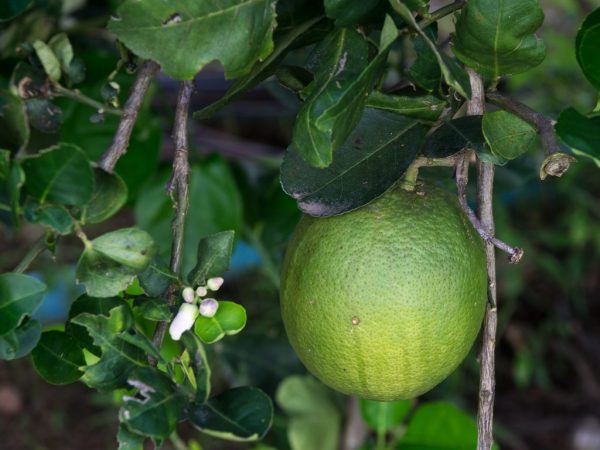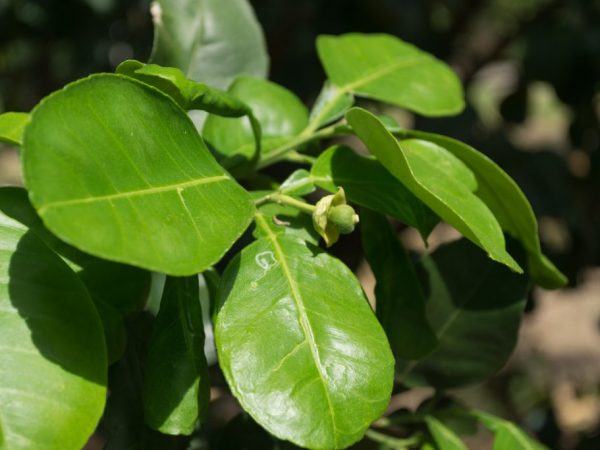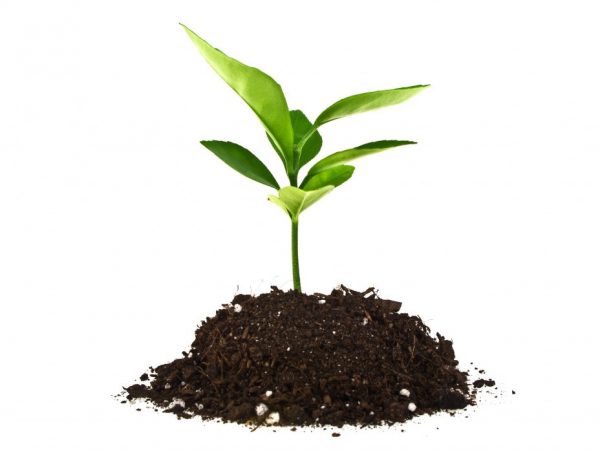How to grow a pomelo from a stone at home
Growing pomelo at home is laborious. This process requires a special approach. The fruit is a citrus fruit, it is large in size, similar to a pear. It is also called "sheddock" or "pompelmus". The culture spread throughout the world from Malaysia.

Growing pomelo from a stone at home
Description of pomelo
The crown of the tree is evergreen, the trees are tall (up to 15 m). The pomelo fruit is large, weighing 10 kg. The peel is green or yellow, depending on the variety. Citrus slices are in an inedible film.
Trees bear fruit for up to 7 months.
Citrus is rich in nutrients. It is used for diseases with the heart. If you eat it regularly, your risk of diabetes will decrease.
Pomelo strengthens the immune system, accelerates metabolism.
Varieties
The main types of culture:
| Variety | Features of the |
| Thongdi |
|
| Khao namphung |
|
| Khao phuang |
|
| Khao horn |
|
Growing

Growing a tree at home is real
It is possible to grow a pomelo at home, despite the exoticism of the fruit. For growing a tree, seeds (seeds) of fruits are used.
For the planting material to be of high quality, it is important to choose the right fruit. He must:
- be dense and not seem empty;
- have a pleasant scent with a citrus tinge;
- have a completely smooth, soft skin;
- have no stains.
Preparation of planting material
First, they buy pomelo seeds or extract them from the pulp of the fruit. The citrus itself must be ripe for the seeds to germinate well. Before planting, the planting material is stratified.
The bones are washed and dried, after which they are covered with clean sand. Use any convenient container (pot), and then put it in the lower compartments of the refrigerator. The average temperature should be 5 ° C. In such conditions, the bones are stored for 2 months.
The second way to prepare seeds is to rinse them in water at room temperature. After that, the planting material is sent to a special solution - a growth stimulator - in a proportion of 5 drops per 100 ml of water.
Germination
In order for the pomelo seeds to germinate well, materials are used that can retain liquid for a long time: cotton wool, loofah, gauze, moss. The material used is soaked in hot water. After that, the seeds are placed on it and covered with a plastic bag.
This procedure traps heat and moisture. It is done daily.
Landing
You can plant a pomelo as soon as the seeds have sprouted. Use a small container with holes in the bottom so that the root system does not rot. Drainage (charcoal) is laid out on the bottom.

You can prepare the soil for the plant yourself.
Choose a special soil. They also prepare the substrate at home. Its components:
- sheet soil;
- sand;
- humus;
- sod soil.
Pomelo grows best in neutral soil. After preparing the soil and container, the prepared planting material is placed on the substrate and sprinkled with soil by 1 cm. After the seedling is sprayed with water and covered with a cloth. The pot is placed in a well-lit place, but without direct sunlight.
After a couple of days, the tissue is removed. The required temperature for active development is up to 28 ° C. Citrus loves moisture, the earth must not be overdried. Pomelo sprouts appear in a couple of weeks.
Transfer
Pamela is transplanted into the fresh soil at home in late winter or early spring. The procedure is carried out using transshipment so as not to damage the root system. The prepared container should be larger than the previous one. Transplant if the tree does not grow or develop, or if the roots begin to protrude from the pot.
The transplant is carried out to make it easier to grow pomelo from seeds and the plant could grow more actively. You cannot replant the tree during the periods:
- when the tree is in bloom;
- rest;
- the appearance of buds;
- fruiting.
The transfer is carried out together with a small clod of earth on the roots so as not to damage the plant. Any damage leads to the death of the entire tree.
Care
To grow a pomelo at home, you need to know about its preferences. The place where the flowerpot is located should be well lit. The culture is transferred to a windowsill that faces South, East or West. If the side is south, the pomelo is removed from the windowsill for the period 12: 00-16: 00.
Recommended temperature range for fruit is 24 ° С-30 ° С. In winter, the tree should not be placed next to heating devices: this destroys the plant.
Air humidity should be high, in summer and spring sheddock is sprayed twice a day. This procedure avoids the appearance of pests. To increase the humidity, a glass of water is placed near the flowerpot.
It is possible to grow a pomelo from a stone, regularly feeding the plant with nutrients. Watering is carried out systematically, without overflowing the fruit. Use:
- distilled water;
- thawed;
- rain.
Pests and diseases
The most common pests when growing pomelo from a stone at home are the scale insect and spider mite. Symptoms can vary, usually the leaves of the tree roll up and become dry, covered with cobwebs. Also, dark spots form on the crown or a sticky bloom appears.
For treatment, use a solution of soap, garlic tincture or tobacco dust. Any of these solutions are applied to a tissue or cotton swab. After that, they wipe each leaf. The crown and trunk are sprayed.
In case of foliage burns, white spots on the surface are characteristic. If the humidity level is low, the leaves curl up. If the plant is poured, the foliage turns black and falls off.
Conclusion
Growing pomelo at home has its own characteristics. If you choose the right composition of the soil, create the necessary climatic conditions, the tree will actively develop. The required temperature regime is up to 30 ° С, the air humidity is high. Citrus is regularly examined in order to detect a pest or disease in time.


